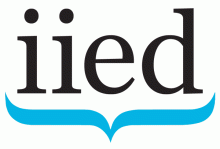Resource information
IIED’s Forest Team engagement with Mozambique began in January 2002, with a two year policy support process to the multi-donor ProAgri programme based at the then Direcção Nacional de Florestas e Fauna Bravia (DNFFB) – later to become the Direcção Nacional de Terras e Florestas (DNTF) – the national directorate of land and forests. At that time, the main legal frameworks had only just come into being, with the 1997 Land Law, the 1999 Forestry and Wildlife Law and the 2002 forest regulations.
Teams of local consultants worked with provincial forest and wildlife services (SPFFB) to consult both the private sector and community groups in forest areas in all 10 provinces about a series of issues (see Macome, 2002; Macome et al. 2003; Maculule and Cuco, 2002; Maculule, 2003; Mangue et al. 2002). One of these issues involved the prospects for supporting efforts at community forestry and the community structures through which such support could be operationalised. The main conclusions from those consultations were summarised in Nhantumbo and Macqueen (2002). While the Land Law had given self-defining communities land use rights by dint of their historic occupation of the land, the Forest and Wildlife Law restricted commercial timber use to ‘concession’ or simple licence’ procedures that were proving onerous for community groups. In 2002, a firm recommendation was to strengthen the capacity of Community Management Committees (CGCs) to develop required natural resource management plans based around commercial interest groups (for example, for charcoal, honey production etc. – but normally excluding timber).
From 2004 onwards, IIED strengthened its engagement with Mozambican institutions through the Forest Governance Learning Group (FGLG) and continued to explore how to increase benefits from sustainable forestry to community groups with DNTF, the Universidade Eduardo Mondlane (UEM), Justicia Ambiental
(JA!), Centro De Integridade Publica (CIP) Terra Firma and latterly Centro Terra Viva (CTV). Notable report such as Johnstone et al (2004) highlighted the various ways in which communities were expected to benefit under the legislation in force: subsistence level use of the resources; participation in comanagement; community consultation and approval prior to allocation of exploitation rights to third parties; development benefits derived from exploitation under a concession
regime; return of earmarked 20 per cent of forestry tax revenue to the communities; and 50 per cent of the value of fines received by the individual contributing to law enforcement. New guidelines were prepared to try and enhance the benefits that communities received from timber concession allocations
in their land area (Joaquim et al. 2005).
Given the dearth of direct support to community forest enterprises in Mozambique, IIED approached CTV in 2007 with a view to launching Forest Connect. CTV is a non-governmental organisation which works on good environmental governance and sustainable management of natural resources. In the latter programme area, CTV aims to implement sustainable income generating projects based on natural resources. With a substantial track record in such issues, CTV were felt to be an obvious candidate to explore how better to support small forest enterprises within Mozambique. Work commenced in May 2007 and, despite attempts to secure further resources, concluded through lack of further funding in
March 2011.
The management of Forest Connect within CTV took place through a lead staff member within the programme on ‘Sustainable Management of Natural Resources’ under the overall direction of CTV’s Executive Director. The programme has worked in close collaboration with the governmnets progrmame for small enterprise support (IPEME).



